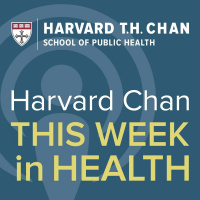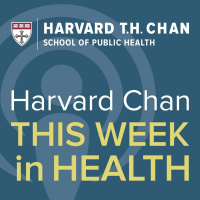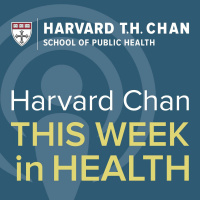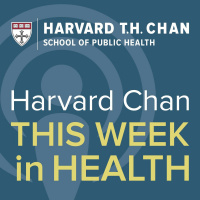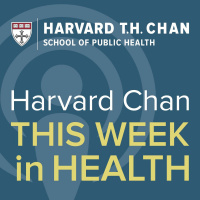Harvard Public Health
- Autor: Vários
- Narrador: Vários
- Editor: Podcast
- Duración: 57:02:16
- Mas informaciones
Informações:
Sinopsis
A community of leaders producing powerful ideas that transform the lives and health of people everywhere.
Episodios
-
March 22, 2018: Living with guns rather than dying with guns
22/03/2018 Duración: 29minOn February 14, 2018, a gunman opened fire inside Marjory Stoneman Douglas High School in Parkland, Fla., killing 17 people and wounding 17 more. That shooting and the students who survived have reignited a national conversation about guns under the banner "Never Again." On March 24, people across the country will gather for the March for Our Lives to protest gun violence—and to call for changes in firearm policy. Ahead of the nationwide marches we spoke to David Hemenway, director of the Harvard Injury Control Research Center, and one of America’s top firearms researchers. Hemenway discussed why these student-led protests may finally be the tipping point for gun legislation in America. Plus—he explained the public health approach to preventing gun violence and shared the changes to firearms policy that could have the biggest impact on saving lives.
-
March 8, 2018: India's epidemiological transition
08/03/2018 Duración: 29minA large new study of more than 1.3 million people finds high rates of diabetes and hypertension in India. We'll speak to experts about what could be driving this trend—and how health systems in India and around the world must adapt to address the growing threat from non-communicable diseases. You'll hear from Pascal Geldsetzer, a third-year doctoral student in the Department of Global Health and Population, Lindsay Jaacks, assistant professor of global health, and Rifat Atun, professor of global health systems.
-
Feb. 22, 2018: Discrimination in America
22/02/2018 Duración: 29minA new series of polls from the Harvard Opinion Research Program is shedding light on how Americans experience discrimination on a day-to-day basis. While many surveys have explored Americans’ beliefs about discrimination, this series, "Discrimination in America," asks people about their own personal experiences with discrimination. In this week's episode we speak with the director of the polling series, Robert Blendon, Richard L. Menschel Professor of Public Health, about the key findings of the series and what they mean for a range of pressing issues in America—including the “Me Too” movement, health care, and policing.
-
Feb. 15, 2018: Clearing up the confusion over fat (Update)
15/02/2018 Duración: 22minFebruary is Heart Month, so in this week's podcast we're revisiting one of our most popular episodes: an in-depth look at dietary fat. We'll share tips for including more beneficial fats in your diet, plus we'll give you the bottom line on butter and health. You'll hear from two experts: Walter Willett, professor of epidemiology and nutrition at Harvard T.H. Chan School of Public Health, and Dariush Mozaffarian, dean of the Friedman School of Nutrition Science and Policy at Tufts University.
-
Feb. 08, 2018: A public health approach to an aging world
08/02/2018 Duración: 27minPeople are living longer than ever before—and that is raising new questions and challenges. In this week's episode, we explore how public health researchers are grappling with issues surrounding aging and longevity. Lisa Berkman, Thomas D. Cabot Professor of Public Policy, Epidemiology, and Global Health and Population and Director of the Harvard Center for Population and Development Studies, will explain how demographic shifts will force us to rethink work and retirement. And Albert Hofman, Chair of the Department of Epidemiology and Stephen B. Kay Family Professor of Public Health and Clinical Epidemiology, explores how improved heart health may be behind an apparent decline in new cases of Alzheimer’s disease.
-
Feb. 1, 2018: The Surgeon General's opioid strategy
01/02/2018 Duración: 31minIn this week's podcast we share an in-depth conversation with Vice Admiral Jerome Adams, the 20th Surgeon General of the United States. During a recent interview with Voices in Leadership, Adams outlined his strategy for addressing America's opioid epidemic and shared how his family's own experiences with addiction have informed his work.
-
Jan. 25, 2018: Big data and public health
25/01/2018 Duración: 26minResearchers are now harnessing vast amounts of information to assess what works in medicine and public health. In this week's podcast, we explore why this approach holds promise—but why it also comes with potential risks. You'll hear from Miguel Hernan, Kolokotrones Professor of Biostatistics and Epidemiology, who is a leading expert in the field of causal inference, which includes comparative effectiveness research to guide policy and clinical decisions. We discussed how researchers are using big data to answer important questions about health—and the safeguards that need to be in place to avoid misleading results.
-
Jan. 18, 2018: Changing the food environment
18/01/2018 Duración: 24minIn May 2018, the U.S. government will be rolling out broad new menu labeling regulations. As part of the Affordable Care Act, restaurants and other food outlets with more than 20 locations will be required to post calorie counts right on their menus. And new research shows those rules may already be having an impact before they even go into effect. A study led by Sara Bleich, professor of public health policy, shows that many large chain restaurants have started removing higher calorie items from their menus. In this week's episode, we speak with Bleich about what these changes could mean for America's fight against obesity—and how policy changes can be used to alter the country's unhealthy food environment.
-
Jan. 11, 2018: Fundamental questions
11/01/2018 Duración: 27minBasic science is at the heart of many of our greatest health advances. And in this week's episode we speak with two scientists who are asking fundamental questions about how our bodies work. The answers could help crack the secrets of diseases ranging from diabetes to dementia. For the past three-plus years those two scientists, Robert Farese and Tobias Walther, have done something almost unheard of in public health: run a joint lab. Their work largely focuses on understanding how our cells store and then synthesize fat—a process known as lipid metabolism. It's work that has wide-ranging implications for a variety of diseases. During an in-depth conversation Farese and Walther shared insight on their work, the joys and challenges of running a lab together, and the importance of basic scientific research.
-
Dec. 14, 2017: Public health and behavioral economics
13/12/2017 Duración: 28minEach year in sub-Saharan African more than a million women and newborns die during childbirth—or shortly thereafter. One key to preventing these deaths is making sure women deliver in high-quality health care facilities. But in many areas—such as Nairobi, Kenya—women are faced with an overwhelming number of choices of where to give birth, with few high-quality options. In this week's episode, we'll take a look at how researchers are using lessons from behavioral economics to see if they can influence women to give birth at the higher quality facilities—and in turn receive better care. We'll speak with Jessica Cohen, associate professor of global health, about her research, which draws on knowledge about human psychology to better understand how people make decisions. The key question at the center of her new study: Can behavioral "nudges" in the form of cash transfers lead to better maternity care? Later in the episode, you'll hear from Roman Pabayo, research fellow in the Department of Social and B
-
Dec. 7, 2017: Nuts and heart health
07/12/2017 Duración: 14minEating several small servings of nuts each week may significantly lower your risk of heart attack or stroke, according to a new study from Harvard T.H. Chan School of Public Health. In this week's episode we speak with Marta Guasch, a research fellow in the Department of Nutrition, and author of the study—which is one of the largest to date on the health benefits of nuts. We'll discuss what differentiates this study from other research on nuts, how many you should be consuming each week, and simple ways to include more nuts in your diet. Later in the episode, we’ll tell you about research examining the effectiveness of strategies to increase physical activity on a large scale.
-
November 30, 2017: The importance of tracking eating disorders
30/11/2017 Duración: 20minAround 30 million Americans will be affected by an eating disorder in their lifetime, but these psychiatric disorders are not regularly tracked by the Centers for Disease Control and Prevention (CDC). That's why a coalition led by Harvard’s Strategic Training Initiative for the Prevention of Eating Disorders (STRIPED) is asking the CDC to monitor eating disorders as a part of national disease surveillance efforts. In this week's episode, we speak with Bryn Austin, professor in the Department of Social and Behavioral Sciences and director of STRIPED, to learn how better data on eating disorders could improve treatment and prevention.
-
November 20, 2017: A sustainable Thanksgiving [rebroadcast]
20/11/2017 Duración: 08minIn this week’s episode: It may be hard to have a truly healthy Thanksgiving, but we have some tips from Gary Adamkiewicz, assistant professor of environmental health and exposure disparities, to make your holiday feast more environmentally friendly.
-
November 15, 2017: The science of Thanksgiving [rebroadcast]
15/11/2017 Duración: 27minIn this week’s episode: The science of Thanksgiving. Guy Crosby, adjunct associate professor in the Department of Nutrition, explains how you can use food science to cook the perfect holiday meal, plus he shares recipes for simple, delicious, and healthy side dishes.
-
November 9, 2017: A cellular message in a bottle
09/11/2017 Duración: 11minIn this week's episode we delve deep into our cells to talk about some exciting new basic science research coming out of the Harvard Chan School. We spoke with Quan Lu, associate professor of environmental genetics and pathophysiology, about a newly discovered cellular messaging mechanism that could have important implications for disease treatment—and may even change how public health researchers can track the impact of harmful environmental exposures, such as air pollution.
-
November 2, 2017: An opioid emergency
02/11/2017 Duración: 16minAccording to preliminary estimates from the Centers for Disease Control (CDC), an estimated 45,000 Americans died from opioid overdoses in 2016. On October 26, President Trump responded to the crisis by declaring it a public health emergency. In this week's episode we'll examine what that means, how we arrived at this point, and why that presidential election likely won't be enough to stem the tide of opioid addiction and overdoses. You'll hear from Howard Koh, Harvey V. Fineberg Professor of the Practice of Public Health Leadership, and Michael Barnett, assistant professor of health policy and management.
-
October 26, 2017: A new era of epidemics
26/10/2017 Duración: 22minIn this week’s episode we speak with two leading experts on Zika virus—which grabbed international attention when it sickened a million people in dozens of countries more than two years ago. Marcia Castro is associate professor of demography in the Department of Global Health and Population at Harvard Chan School. She has extensively studied the lingering effects of Zika in Brazil—including how the virus has affected physical and mental health—as well as its effect on birth rates in the country. And Celina Turchi Martelli is professor of epidemiology of infectious diseases and a researcher at FIOCRUZ in Brazil. As the Zika outbreak began, Turchi worked closely with other scientists to track what was happening. Her research helped played a critical role in confirming that Zika did indeed cause microcephaly. Both Castro and Turchi participated in a panel discussion as part of Harvard Worldwide Week. The event, The New Era of Epidemics: Surveillance, Response, Impacts, and Challenges focused on lessons learned f
-
October 19, 2017: An attempt to destabilize Obamacare
19/10/2017 Duración: 23minIn early October, President Trump took aim at the Affordable Care Act (ACA), with two proposed changes that could weaken the law. The President said that the government will stop making cost-sharing reduction payments to health insurance companies. These payments are intended to subsidize plans offered to lower income Americans under the ACA. And in a separate move, President Trump issued an executive order which would ease the rules and regulations for health plans offered under Obamacare and open the door for the creation of association health plans. The moves come just before the next ACA open enrollment period, running from November 1 to December 15. While the changes are not likely to affect plans offered during the upcoming enrollment, Benjamin Sommers, associate professor of health policy and economics, says the changes could lead to higher premiums and co-pays and potentially destabilize insurance markets over the long-term. Visit healthcare.gov to sign up for insurance beginning November 1.
-
October 12, 2017: Eat, drink, and be healthy
12/10/2017 Duración: 26minIn this week's episode we discuss two decades of nutrition science with one of the leading experts in the field. Walter Willett, former chair of the Department of Nutrition, recently released an updated version of his book Eat, Drink, and Be Healthy , which compiles decades worth of evidence about the components of a healthy diet. During an in-depth conversation with Willett, we talk about what's changed in nutrition since the book was first released in 2000 and the topics that will dominate the field in the years to come—including obesity—and how climate change will force us to change how we eat.
-
October 5, 2017: Guns and public health
05/10/2017 Duración: 17minIn the wake of a mass shooting on October 1 in Las Vegas that left at least 59 people dead and more than 500 injured, David Hemenway, professor of health policy at Harvard T.H. Chan School of Public Health and director of the Harvard Injury Control Research Center, speaks with us about the public health approach to gun control. Hemenway discusses what made the Las Vegas shooting so deadly, how Australia effectively responded to a mass killing in 1996, and why restrictions on federally funded gun research hamper efforts to prevent violence. We also re-play a story on background checks and gun purchases from January, 2017.

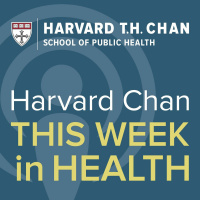
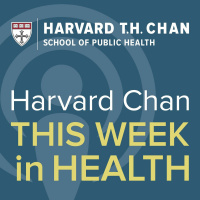
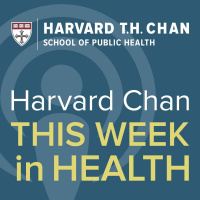
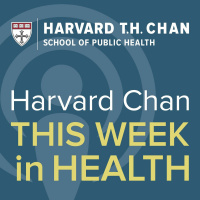
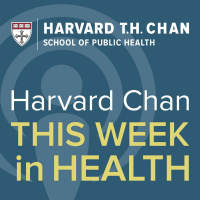
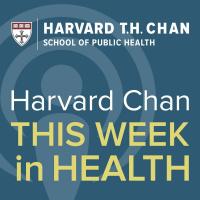

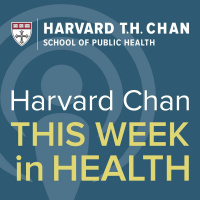
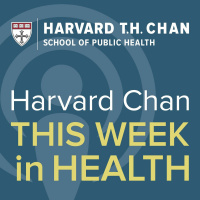
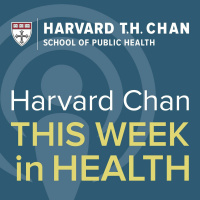
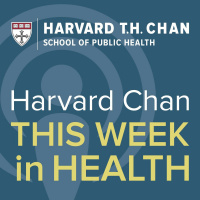
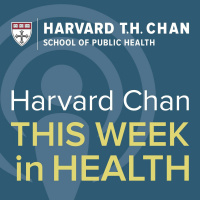
![November 20, 2017: A sustainable Thanksgiving [rebroadcast]](http://media3.ubook.com/catalog/book-cover-image/335615/200x200/666A9CBB-46E3-505F-7532-3B6B02038E14.jpg)
![November 15, 2017: The science of Thanksgiving [rebroadcast]](http://media3.ubook.com/catalog/book-cover-image/335615/200x200/F1C5FCC6-0505-3ED4-E981-6ED20BDD64B3.jpg)
